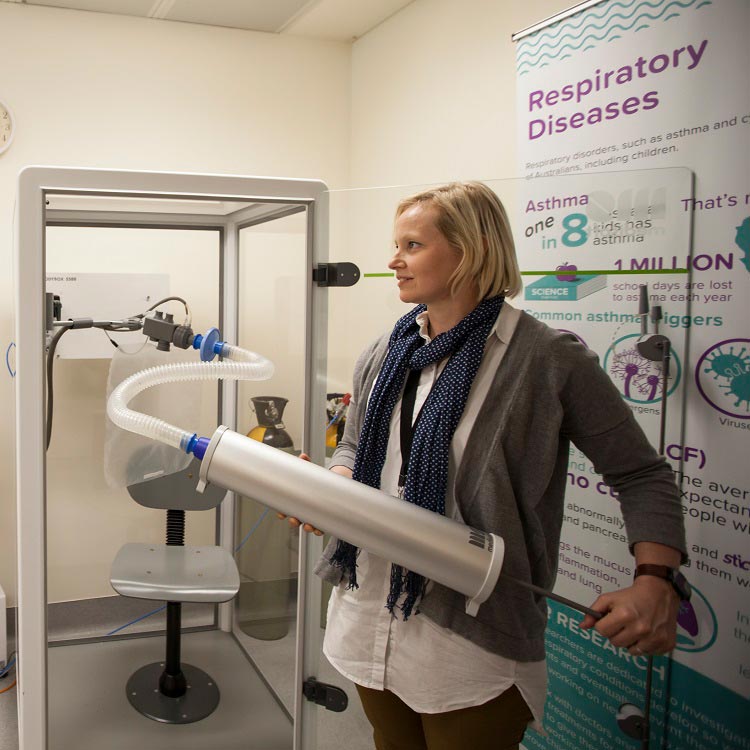Search

News & Events
Directing immune development to curb sky-rocketing diseaseOnce upon a time it was infectious diseases like polio, measles or tuberculosis that most worried parents. With these threats now largely under control, parents face a new challenge – sky-rocketing rates of non-infectious diseases such as asthma, allergies and autism.

The Advancing Innovation in Respiratory (AIR) Health Team is a multi-disciplinary group with skills in clinical medicine, physiology, psychology, and in cellular and molecular biology, that are committed to improving the lives of children with respiratory diseases and their families.
Research
COMBAT CF: A phase 3 multi-centre randomized placebo-controlled study of azithromycin in the primary prevention of radiologically-defined bronchiectasis in infants with cystic fibrosis.A phase 3 multi-centre randomized placebo-controlled study of azithromycin in the primary prevention of radiologically-defined bronchiectasis in infants with cystic fibrosis
Research
SHIP CT: A Phase 3 randomised, double-blind, controlled trial of inhaled 7% hypertonic saline versus 0.9% isotonic saline for 48 weeks in patients with Cystic Fibrosis at 3-6 years of age in parallel with the North American SHIP clinical trial.SHIP-CT, led by Professor Stephen Stick, Director of the Wal-yan Respiratory Research Centre at The Kids, is a unique study in preschool-aged children (from 3-6 years of age) with CF using images of the lung from chest CT scans as the main outcome measure.

News & Events
Very preterm babies at risk of declining lung function throughout childhoodA The Kids Research Institute Australia study published in The Lancet Child & Adolescent Health has found that survivors of very preterm birth face declining lung function

News & Events
Annual Community Lecture: You Are What You BreatheJoin us for our Annual Community Lecture entitled "You Are What You Breathe" with Professor Stephen Holgate.
Research
Role of Tris-CaEDTA as an adjuvant with nebulised tobramycin in cystic fibrosis patients with Pseudomonas aeruginosa lung infections: A randomised controlled trialWe tested if disrupting iron utilisation by P. aeruginosa by adding the Tris-buffered chelating agent CaEDTA to nebulised tobramycin would enhance bacterial clearance and improve lung function in CF patients.
Research
Bile acids in the lower airways is associated with airway microbiota changes in chronic obstructive pulmonary disease: an observational studyChronic obstructive pulmonary disease (COPD) is a complex disorder with a high degree of interindividual variability. Gastrointestinal dysfunction is common in patients with COPD and has been proposed to influence the clinical progression of the disease. Using the presence of bile acid(s) (BA) in bronchoalveolar lavage (BAL) fluid as a marker of gastric aspiration, we evaluated the relationships between BAs, clinical outcomes and bacterial lung colonisation.
Research
Phage therapy to treat cystic fibrosis Burkholderia cepacia complex lung infections: perspectives and challengesgeBurkholderia cepacia complex is a cause of serious lung infections in people with cystic fibrosis, exhibiting extremely high levels of antimicrobial resistance. These infections are difficult to treat and are associated with high morbidity and mortality.
Research
A near-complete genome of the uncultured Staphylococcus aureus phage COMBAT-CF_PAR1 isolated from the lungs of an infant with cystic fibrosisIn cystic fibrosis, bacteria–bacteriophage interaction in the lower airways is poorly understood. We present the near-complete genome of the uncultured Siphovirus-like bacteriophage, Staphylococcus aureus phage COMBAT-CF_PAR1, isolated from the lower airways. The genome spans 41,510 bp with 33.45% guanine–cytosine content and contains 65 open reading frames.
